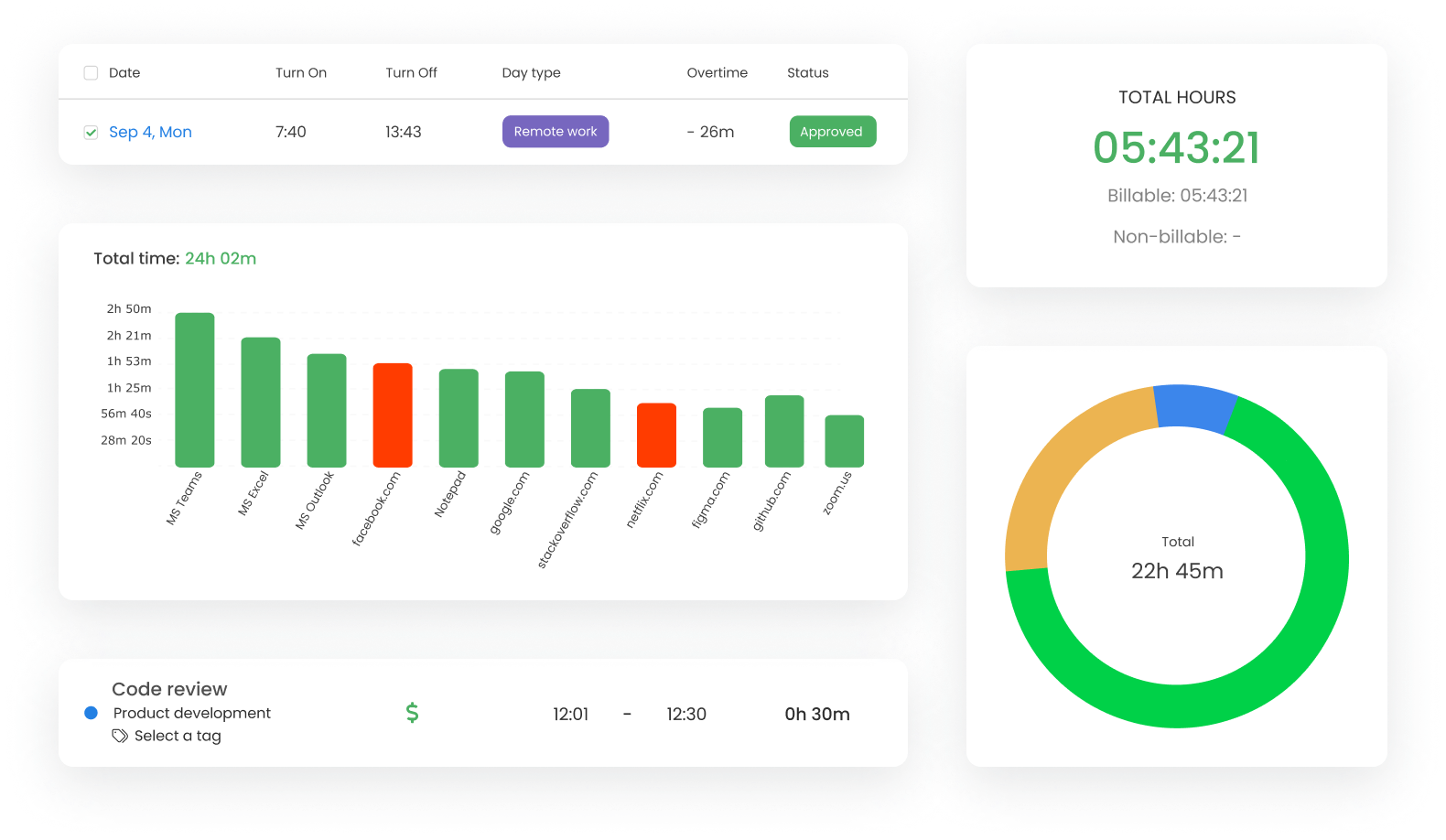9 Practical Tips to Help Your Team Avoid Work Overload
-
Kate Borucka
- 2020-07-09
- 10 min read
Sometimes we all struggle with work overload. Too many tasks, large projects, endless meetings, and it ends with spending long, extra hours by the desk. While it’s a common thing for individuals, work overload affects also entire teams, and it’s becoming more prevalent.
Find out what work overload is, how it affects your employees, and what you can do to prevent it.
What Is Work Overload and Why Does It Happen?
Statistics show that people work more than ever before and the numbers continually grow. Even though technological progress allows people to do more in less time, we dedicate long hours to work. According to the American Time Use Survey, in 2019 full-time employees averaged 8.5 hours of work time on weekdays they worked, and 5.5 hours on weekend days and holidays they worked. And with the rise of remote work during a pandemic, the overwork time grew even more.
Why do we work so much? Is it because we love to spend our free time in the office enclosed with four walls? While for some people a job is a hobby, not many employees feel happy about spending extra hours at work. But with today’s great technological advancement and fast pace of the world, especially in business, we often get caught in the rat race. The long-hour workweek gives us the feeling that we can do more, better, and faster so we take upon more assignments than we can do.

We all feel overwhelmed with work sometimes.
And that’s when work overload happens. In teams, defining its cause may be more tricky as the problem often lays deeper than just in an excess of tasks. And then it becomes a problem both for the employer and employees.
There may be many reasons behind work overload but here are the four most common:
- Lack of clearly defined priorities: when your team doesn’t know what to focus on, it might cause multitasking and, eventually, lead to opening too many tasks and projects.
- Too many responsibilities: every business should have departments dedicated to specific sectors, for example, marketing, sales, IT. There should be a clear boundary between responsibilities. On the other hand, too many departments may lead to creating organizational complexity where people are forced to constantly communicate and collaborate.
- Bad company culture: when an organization doesn’t have clearly defined values, mission, and a unified team, things might get out of control.
- Employees are afraid to admit they have too much work: this can happen out of fear of losing a job, or not being understood.
Work overload is a common problem for teams and the effects can be bad for business. It may result in employee burnout, underperformance, and even high employee turnover. It can take a bite out of your budget and limit opportunities for development.
9+ Tips to Help Your Team Prevent Work Overload
It may not be easy to spot the signs of work overload. Especially if the problem has many layers that overlap. But you can effectively eliminate too much work in your team. Take a look at these tips to avoid the negative effects.

1. Learn to say „no”
There’s a common belief that opposing or disagreeing with your colleagues may ruin your work relationships or even the whole career. But according to this article, when you’re assertive, you stand up for your rights. Being assertive is one of the most important communication skills in the workplace. It means „finding the right balance between passivity (not assertive enough) and aggression (angry or hostile behavior). It means having a strong sense of yourself and your value, and acknowledging that you deserve to get what you want.”
There’s nothing wrong with saying „no” when new tasks pile up on your to-do list. You only have to communicate with empathy and patience.
2. Develop a Time Budget
Elizabeth Grace Saunders, a time management coach and the author, points out that a well-developed time management system in a team can help avoid work overload, „As a time coach, I’ve found that one of the biggest keys to achieving balance is to start objectively evaluating the fact-based aspects of your schedule, rather than letting a vague sense of fear drive your decisions. No matter how valuable a team member you may be, no one can fit 100 hours of work into 40 hours a week, or even 60 hours.”
She also states that „once you have a sense of your daily time budget, you can calculate your weekly time budget by adding up the totals for each day. (…) Once you understand the size of your time budget, then you can evaluate the different time costs during your workday.”
You can also write down a list of all your daily commitments and set percentage time limits to them how much time you dedicate to each. Incorporating nearshore software development services can significantly streamline project timelines and reduce workload, allowing teams to focus on core objectives with enhanced efficiency.
Another helpful solution is to use time tracking software. Not only does it help in tracking time spent on work but also monitor billable hours, productive and unproductive activities, manage the budget, and allocate time and money to tasks, projects, and clients.

Get to know where your time goes with TimeCamp!
Track time in projects and tasks, create reports, and bill your clients in just one tool.
3. Set clear goals
Working without clearly defined objectives is like walking in the fog. You don’t know where you are or where you’re going. And when you’re walking with your team, it’s easy to get lost. People will work effectively when they know precisely what to do. You can set clear goals in three steps:
- Think about what you want to achieve: a team should gather in a room, brainstorm all the ideas, projects and tasks, and define goals, for example, increasing a conversion rate of a website within a year.
- Create a system: when the goal(s) is set, it’s time to think about a system that will help deliver the result; what to do to increase the conversion rate? It might be investing time and money into the content on the website, adding a pop-up message, etc.
- Align the environment: when you have a goal and a system, it’s a good idea to help the environment help you. In our case, that would mean to inform the company that the marketing team is focusing on increasing a conversion rate, and asking them to perform any other task would add more work to what they already do, slow down the progress, and eventually, lead to lower sales and lower revenue.
Setting goals helps to stay concentrated, organize the workflow of the whole team as well as every individual, but above all, it makes it easy to focus on one thing at a time so your team can avoid work overload.
👉 Check our article and find out more about career goals examples
4. Delegate
 Task delegation is one of the easiest ways of reducing workload. The rule is simple—if there is someone who can make a task better than you, delegate. Of course, it’s not about giving out the tasks to anyone just so you have nothing to do. It’s about smartly organizing your work and sharing it with other people for better results and efficiency.
Task delegation is one of the easiest ways of reducing workload. The rule is simple—if there is someone who can make a task better than you, delegate. Of course, it’s not about giving out the tasks to anyone just so you have nothing to do. It’s about smartly organizing your work and sharing it with other people for better results and efficiency.
You can also outsource many of the business activities at a reasonable price. It’s worth to invest in outsourcing so your team can focus on the most important elements of their job. It’ll boost their productivity and they won’t feel overwhelmed.
However, it’s important not to create work underload—a situation when your employees have too little tasks. You just need to communicate with the team to find the balance.
5. Leverage technology
Not using technology in the workplace in the era when things are automated would be a sin. As Louis Efron wrote in his article for Forbes, „if leveraged correctly, technology has the ability to positively influence and support our humanity rather than push it away. It can help engage, recognize and protect those we care about and the people who work in organizations.”
He also suggests that technology should allow people to be effective, innovative but also stay connected at all levels, „it should facilitate the comfortable and expeditious flow of people, ideas and emotions.”
technology helps to address the negative elements in the workplace, replace long, messy e-mail threads, customer management, task and project management, and administrative activities. It can even help with specific functions in certain industries. For example, you can optimize your brewery’s productivity with Ollie or streamline your online scheduling for your yoga business with Mindbody.
There are speculations that technology and developing AI will replace us at work but in fact, it will only make our jobs better by automating and optimizing numerous processes.
6. Minimize task list and prioritize
If you keep a list of things to do, you know that new tasks are born every day. And it’s challenging to tackle them all.
Alicia González-Ramos, a Learning and Development Officer at CABA Charity (Chartered Accountants Benevolent Association), suggests making a list of all your tasks and rating them on a scale from 0 to 5, where 0 is the least important and 5 is essential. Then, work through your tasks by starting on those with the highest priority. You may even find some of them unnecessary.
Make it a team exercise and try to work it out together. Make all team members write down their tasks and exchange lists. It’ll help people see their work from the perspective of teammates and reevaluate goals.
Another trick is not to write down things that take less than 5 minutes. Instead, do it instantly, it’ll be helpful in minimizing your task list.
If you’re a manager, let people stop doing things so they can prioritize and focus on the most important activities. Otherwise, the task list will keep growing.
7. Analyze organizational structure
 Organizational structure helps to draw boundaries, set proper relationships, and enhances collaboration. If you don’t have a clear structure within the organization, tasks may encumber the entire business, making people work slowly and hectically.
Organizational structure helps to draw boundaries, set proper relationships, and enhances collaboration. If you don’t have a clear structure within the organization, tasks may encumber the entire business, making people work slowly and hectically.
The hierarchy and roles in your business should be defined precisely. Certain departments should be responsible for different aspects of the business. Overlapping roles will cause confusion and slow down team dynamics.
A research paper by Atlassian Confluence says to „embrace diversity” since it improves organizational structure. The researchers say that „establishing a direction that generates confidence and understanding creates a positive flow in cooperation aligning perspectives in diverse groups.”
The same report additionally says that role structures can also help in avoiding ambiguities and resolve problems with different expectations, „managing through effective use of role structures resolves problems considering the views of many parties. Earning among team members from the sharing of multiple perspectives and can even fuel innovation as unique options are more fully explored.”
Good leadership, strong structure, and inclusive company culture increase workplace performance, reduce work overload, and help to reach the goals of the organization.
8. Limit collaboration
Yes, you’re reading it right—limited collaboration is one of the ways to limit work overload. Michael Mankins in his article for Harvard Business Review points to organizational complexity as one of the main reasons for work overload in a team, „as companies grow, they naturally add new dimensions to their organizations. A single-product enterprise, for example, might add new products, focus on new customer segments, or even enter new geographic markets. Each of these additions necessitates more interactions between stakeholders in order to make and execute critical decisions.”
In this case, there are more meetings, more communication platforms, more emails, and more things to do. It’s an endless, self-perpetuating circle of processes.
To reducing collaboration, Mankins proposes several steps:
- Limit meetings: develop a procedure for meetings, check whether all the meetings are necessary, and if there are too many, what can be done to limit their number.
- Monitor team dynamics: analyze organizational structure to examine the links and connections between tasks, projects, and teams to eliminate unnecessary or repetitive ones.
- Simplify the operating model: if it’s possible, cut the nodes in the collaboration process; perhaps, some of them are unnecessary and you’re stuck in the „collaborating for collaboration’s sake” model. Too many people in decision making don’t mean making better decisions. Read more about group decision making.
- Real-time feedback from teams: leaders should know how much they impose on their teams. Getting feedback lets them see what’s the state of work and tasks.
Sometimes the less means better.
9. Stay with your team
Don’t walk away from the problem, stay with your team, no matter what happens. Be available, help them develop their skills, communicate, support, and talk to them. Together, you create a small family and supporting each other, whether you’re the leader or a teammate, can help you go together through the process of healing.
„Alone we can do so little; together we can do so much.” – Helen Keller
Additional practices
There are many smallish things that you can do to prevent work overload. Even if at the moment your team doesn’t have a problem with piling tasks. After all, prevention is better than cure.
Take a look at some of the other practices that can help in organizing work:
 1) Limit information intake ⇨ every day we are boomed with millions of words, gestures, and images. But we don’t have to be. Scrolling down Facebook, or newsfeed is an endless activity and a great distractor. It takes a lot of our time and clutters our head with unnecessary data. Do you even remember what you read in the news yesterday? Or an hour ago?
1) Limit information intake ⇨ every day we are boomed with millions of words, gestures, and images. But we don’t have to be. Scrolling down Facebook, or newsfeed is an endless activity and a great distractor. It takes a lot of our time and clutters our head with unnecessary data. Do you even remember what you read in the news yesterday? Or an hour ago?
2) Pay attention to mistakes ⇨ it’s okay to make mistakes. But when they start to become normalcy, something’s wrong. Be careful as it may be the first sign of work overload in your team.
3) Embrace uncertainty ⇨ the sudden outbreak of pandemic has shown us that we live in uncertain times. Opportunities are hidden where we’re afraid to go. Take your chances and go for the unknown. It’ll help your team develop, become better at organizing their tasks, and make it easier to reevaluate the current state of work.
4) Provide health programs ⇨ when employees know they are cared for, they are more productive and help your business strive. Investing in your team is one of the best things you can do for your company (and for the people).
5) Force your employees (or yourself) to go on vacation ⇨ when employees work too much or work without taking days off, they suffer burnout. According to statistics, we are stressed more than ever. And work-related stress may cause health problems such as anxiety, sleeping disorder, fatigue, and other harmful difficulties.
6) You can also outsource many of the business activities at a reasonable price. There are many reputable outsourcing companies that can help you get started. It’s worth to invest in outsourcing so your team can focus on the most important elements of their job.
It’s alright to take a break, take a nap, go on a walk, on a one-day trip, or even two-week vacation. We all have to recharge the batteries.
Conclusion
When work overload happens, it may be too late to quickly solve the problem. That’s why it’s better to prevent it. If in your organization all the cogs are running smoothly, you shouldn’t worry. However, every cog has to be systematically oiled and checked for glitches. That’s why you need to always review the processes and team dynamics in your business.
What are your ways of avoiding an excess of work? Let us know in the comments!
Stay productive!



2020-10-08 o 06:53
Awesome Blog! It’s a great spot to find new information. Thank you so much for this wonderful article. – shirdi flight packages from chennai
Sri Sairam Subhayatra